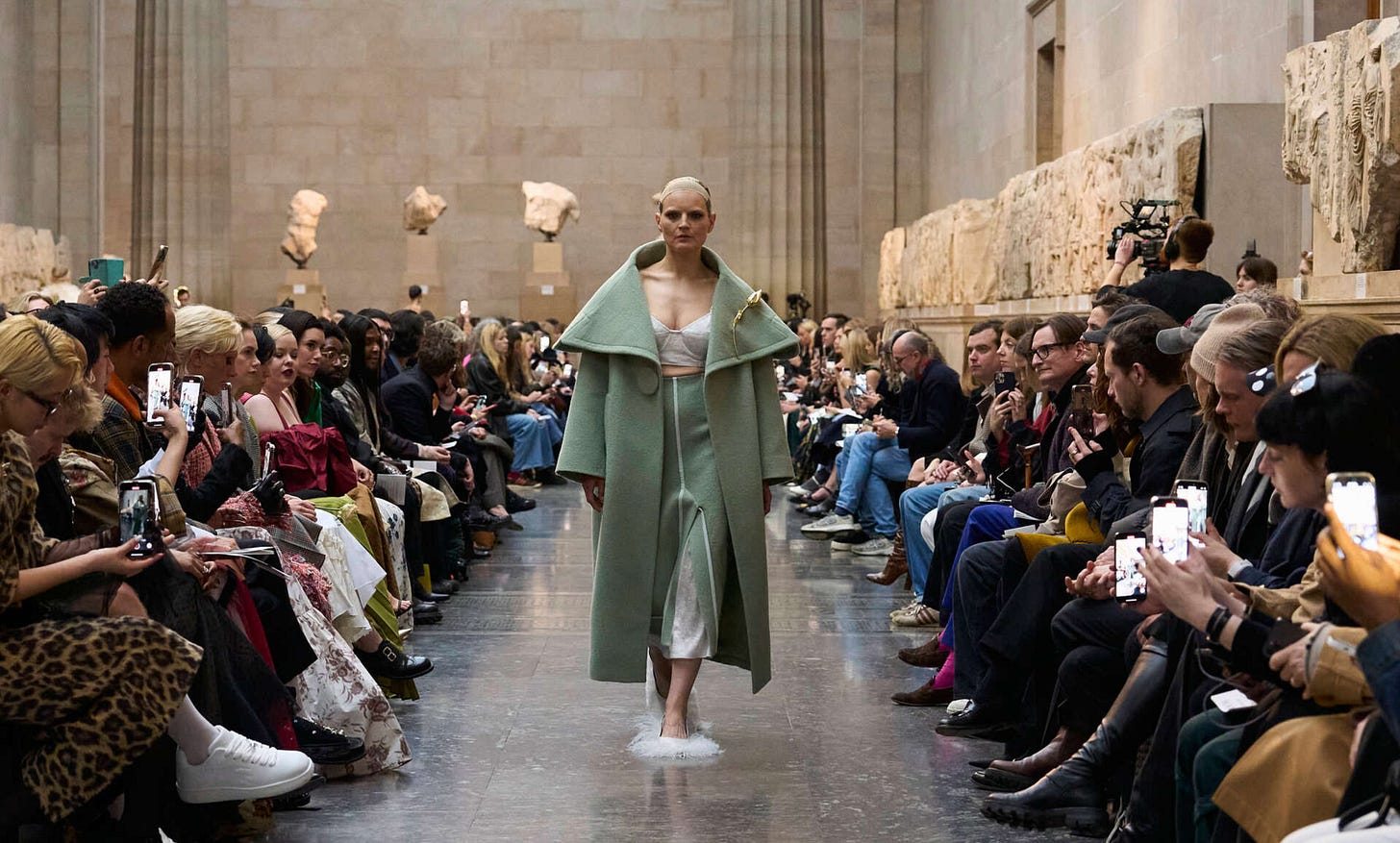Erdem fashion show inspired by Greek opera singer causes backlash over allegedly stolen artefacts
Fashion and politics: do they belong together?
Whether you try to avoid it, or you don't, there is politics in everything, including fashion. Unfortunately, if it is not intended, it can take away from the initial intent of something pure with no means to cause harm. The Erdem Autumn Winter 2024 show at London Fashion Week was Erdem Moralioglu’s innocent tribute to the late American-born Greek opera singer Maria Callas. “I wanted to show in this space that epitomised her Greekness,” the designer told Vogue, adding: “I was interested in the idea of someone starting off somewhere and ending up somewhere else.” I'm sure upon deciding the location of the catwalk, Moralioglu didn’t expect to be thrown straight into the middle of an ongoing political dispute between the British government and the Greek government over the allegedly stolen Parthenon sculptures displayed in the room of the British museum where the show was held.
The Erdem show referenced, specifically, the Greek tragedy Medea from 1953 performed by Maria Callas. Moralioglu took inspiration from both the draped and caped dresses she wore to sing as well as the behind the scenes photographs he found of her getting ready, with Maria wearing silk dressing gowns and pyjamas, in between getting her make-up done. It is easy to see how that contrast is referenced in the show, from the make-up styling of tight, slicked hairstyles often accessorised with wig caps and hair pins on some of the fully dressed-up silhouettes. Elegant feather detail, embellished lace, gloves and heavy earrings also nodded to the glamour of her style, and the floral patterns and golden brooches on many of the coats and dresses celebrated Maria once again, displaying a replication of the flowers that were thrown to her on stage after her performance. The models walked in beat to voice recordings from and about Maria callas and atmospheric string instruments playing through the speakers. The show concluded with live opera singing as the models did their final walk through an audience that included current celebs such as Nicola Coughlan, Gala Gordon, Lily James, Kristin Scott Thomas, Ruth Wilson and Marisa Abela.
The backdrop, however, seemed to be all Lina Mendoni could focus on. The Greek Minister of Culture expressed her anger in a statement calling out the museum: "By organizing a fashion show in the halls where the Parthenon Sculptures are exhibited, the British Museum, once again, proves its zero respect for the masterpieces of Pheidias,". The Parthenon Sculptures are from Athens, Greece. They were made between 447BC and 432BC and were brought to Britain between 1801 and 1805 by Lord Elgin, the British Ambassador to the Ottoman Empire. A formal request for the permanent return to Greece of all of the Parthenon Sculptures in the Museum's collection was first made in 1983. There have been an abundance of discussions since then, and currently there is an ongoing diplomatic spat between British Prime Minister, Rishi Sunak, and Greece’s Prime Minister, Kyriakos Mitsotakis, regarding the future of the Parthenon Marbles. Mendoni’s objection to the use of these ancient artefacts with such deep history being used as a mere prop in a fashion show comes from a place of hurt and offence, which is fair enough.
The British museum claims that the sculptures were taken to England under the oversight of the relevant authorities and that their possession of them is completely legal.
The Erdem Autumn Winter 2024 show has brought to light this ongoing battle between two determined countries and opened up a whole lot of controversy, inviting politicians to the shiny world of fashion. So, the question is, does fashion and politics belong together?
Fashion and politics can most definitely influence each other, they have the power to integrate two audiences who may never have crossed without a common passion, such as the Parthenon Sculptures has done for Erdem Moralioglu and Lina Mendoni. For as long as it’s been around, fashion has been a way to express – whether that's in way of internal feelings, emotions or cultural or political views. These performances, specifically ones during fashion week, widen the exposure of such subjects and spark conversations and inspire further exploration of the topics that emerge during fashion shows. Thus, as I said at the beginning, whether you try to avoid it, or you don't, there is politics in everything.



